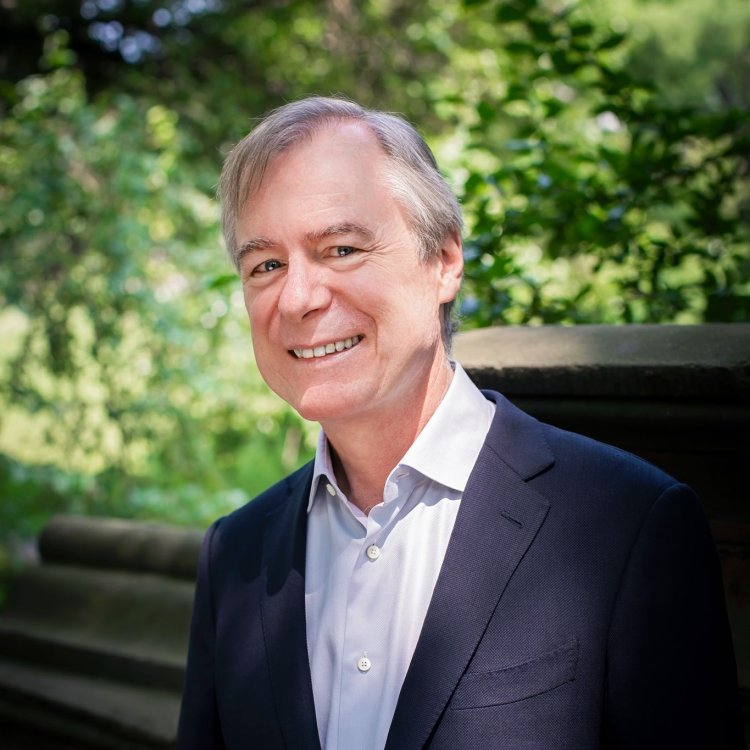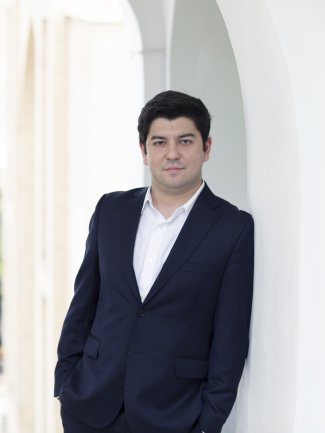Robertson hones new partnership with Utah Symphony in Russian-American program

David Robertson returned Friday night to Salt Lake City to conduct the Utah Symphony for the third time in as many years.
After his well-received debut in October 2020—and his triumphant return engagement in December 2021—there was speculation that Robertson would be named music director, succeeding Thierry Fischer.
That speculation ended this week, when the orchestra announced that Robertson will be the Utah Symphony and Utah Opera’s “Creative Partner,” while the search for a music director continues. The three-year appointment will begin in the fall of 2023. And while some details of the position have yet to be fleshed out, Robertson will conduct and program three concerts each season.
Behzod Abduraimov’s dazzling performance of Prokofiev’s Second Piano Concerto was the program’s musical highlight but underscoring the evening was the reassuring feeling that the talented Robertson will be a leading figure and collaborator with the Utah Symphony for the next few years.
The concert began with John Adams’ The Chairman Dances, a piece for orchestra written in 1985 as a sort of preview for Adams’ 1987 opera Nixon in China. Robertson’s interpretation was slower and looser than the piece is often played, concentrating less on the piece’s churning ostinati and more on its syncopation, phrasing, and sweeping sonorities. This allowed Robertson to highlight swelling flourishes in the strings and low brass and allowed principal keyboardist Jason Hardink’s phrasing and articulation on the piano to shine through.
Throughout the piece, Robertson appeared to be having great fun with the piece’s rhythmic twists; it is billed as a “fox-trot for orchestra” and he and the musicians truly made it dance. The “fade out” at the end, on drums and piano, was particularly delightful.
The frothiness of the Adams work starkly contrasted with the mood of Prokofiev’s Piano Concerto No. 2, which is as technically virtuosic as the composer’s other piano concerti but distinguishes itself with a relentlessly dark mood.
The concerto was dedicated to the composer’s friend Max Schmidthof, who died by suicide while the composer was working on it, and it comes across in some spots as a lamentation and at others as an angry rant. Taking the stage in shiny black shirt and black slacks, Abduraimov turned in an authoritative performance that was as soulful as it was virtuosic in his Utah Symphony debut.
The Uzbek pianist’s musicality was apparent from the moody first notes. Though the main theme features the open fifths and dissonant harmonies that characterized Russian 20th century music, Abduraimov gave it a Romantic quality with a free tempo and dramatic phrasing. The orchestra followed suit, matching his mood and creating moments of spellbinding beauty in the impressionistic string passages. Abduraimov’s phrasing in the cadenza was masterful as he built surely to an intense climax, The trombone’s subsequent entrance and repetition of the grim theme was powerful and terrifying.
The frenetic second movement has more of a modernist quality, but Abduraimov’s interpretation highlighted its more melodic elements and underlying emotion, making it both a technical tour de force and a sardonic cry of despair. This darkness also permeated the third movement, a slow mournful march. Abduraimov sensitively phrased the movement’s thick, languid chords, connecting them with a legato touch, which contrasted with the light lilt he gave the movement’s triplet passages.
The fourth movement begins with a terrifying burst of octaves, scales, and orchestral churn, which quickly calms down into a sad, pensive melody. Abduraimov displayed impeccable technique on the former and a heartbreaking lyricism on the latter.
His emotional and technical range was on full display in the fourth movement’s cadenza and powerful ending, and he left it all on stage, mopping the sweat from his face as he faced the audience’s thunderous ovation. As an encore, he played a short excerpt of the Neapolitan Dance from Tchaikovsky’s Swan Lake.
The concert’s second half was devoted to Shostakovich’s Symphony No. 1, which the composer wrote during his final year at conservatory. He and his teachers called in a lot of favors to get the piece its first performance and it launched Shostakovich’s career. While it foreshadows the greatness of Shostakovich’s later symphonies, it does not hold together as well as the later works, and its thematic elements are, at times, difficult to follow.
The piece begins in fits and starts, and Robertson highlighted its playful qualities. Flutist Mercedes Smith and clarinetist Tad Calcara traded solos with fresh, original phrasing, as did concertmaster Madeline Adkins and Katherine Eberle, while the busy second movement highlighted Hardink on the piano.
With its sense of mysterious foreboding and masterful use of the orchestra, the third movement provided the clearest glimpse of the emotional depths the composer would later plumb in his Fifth Symphony and elsewhere. Robertson achieved a rich full sound in the orchestra and brought a clear sense of how the disjointed melodies fit together. Beginning with an extended drumroll in the snare, the fourth movement called to mind the percussive cacophony found in the finales of the composer’s later symphonies, and Robertson landed the piece with aplomb.
The program will be repeated 7:30 p.m. Saturday at Abravanel Hall. utahsymphony.org

Posted Dec 11, 2022 at 10:22 am by Ross Burningham
It was, indeed, a stunning performance by Abduraimov and the Utah Symphony. However, three caveats:
It is discouraging and disruptive that Utah audiences feel they have to applaud after each movement. Can’t the USO undertake a PR campaign in the printed program and perhaps by a comment prior to the performances to hold applause until the end of the entire work?
Second, the Prokofiev Concerto description in the program was headed: Piano Concerto No. 2 for Violin in G minor, Op. 16. For Violin?!
Thirdly, in the Saturday night performance, Maestro Robertson felt the urge to turn to the audience before the Finale of the Prokofiev (after the tepid applause had died down) and announce “Fasten your seat belts!” Unprofessional and putting undue pressure on the soloist to produce.